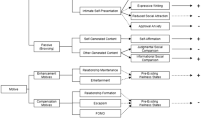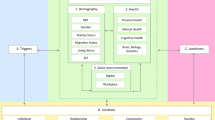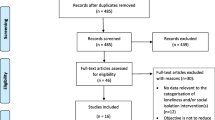Abstract
Diabetes is one of the fastest growing chronic diseases globally and in the United States. Although preventable, type 2 diabetes accounts for 90 % of all cases of diabetes worldwide and continues to be a source of increased disability, lost productivity, mortality, and amplified health-care costs. Proper disease management is crucial for achieving better diabetes-related outcomes. Evidence suggests that higher levels of social support are associated with improved clinical outcomes, reduced psychosocial symptomatology, and the adaptation of beneficial lifestyle activities; however, the role of social support in diabetes management is not well understood. The purpose of this systematic review is to examine the impact of social support on outcomes in adults with type 2 diabetes.
Similar content being viewed by others
References
Papers of particular interest, published recently, have been highlighted as: • Of importance •• Of major importance
World Health Organization. World Health Organization: 10 facts about diabetes. World Health Organization, Chronic Diseases and Health Promotion, Diabetes Unit. Geneva, Switzerland, September 2011. www.who.int/diabetes/en/index.html.
International Diabetes Federation. IDF Diabetes Atlas, 5th ed. Brussels, Belgium: International Diabetes Federation, 2011. www.idf.org/diabetesatlas.
Centers for Disease Control and Prevention. National diabetes fact sheet: national estimates and general information on diabetes and prediabetes in the United States, 2011. Atlanta: U.S. Department of Health and Human Services, Centers for Disease Control and Prevention; 2011.
American Diabetes Association. Diabetes Statistics: data from the 2011 National Diabetes Fact Sheet. American Diabetes Association, Alexandria, Virginia, 2011. www.diabetes.org/diabetes-basics/diabetes-statistics/.
Bardach SH, Tarasenko YN, Schoenberg NE. The role of social support in multiple morbidity: self-management among rural residents. J Health Care Poor Underserved. 2011;22:756–71.
van Dam HA, van der Horst FG, Knoops L, Ryckman RM, Crebolder HFJM, van den Borne BHW. Social support in diabetes: a systematic review of controlled intervention studies. Patient Educ Couns. 2004;59:1–12.
Ford ME, Tilley BC, McDonald PE. Social support among African-American adults with diabetes, part 1: theoretical framework. J Natl Med Assoc. 1998;90:361–5.
Taylor SE. “Social support: a review”. In Friedman MS, editor. The handbook of health psychology. New York: Oxford University Press; 2011. pp. 189–214.
Heaney CA, Israel BA. Social networks and social support. In: Glanz K, Rimer BK, Viswanath K, editors. Health Behavior and Health Education: Theory, Research, and Practice. 4th ed. San Francisco: Jossey-Bass; 2008.
Krause N. Social support, stress, and well-being. J Gerontol. 1986;41(4):512–9.
Wills TA. Social support and interpersonal relationships. Prosocial Behav Rev Pers Soc Psychol. 1991;12:265–89.
Uchino B. Social Support and Physical Health: Understanding the Heath Consequences of Relationships. New Haven: Yale University Press; 2004. p. 17.
Cohen S, Wills TA. Stress, social support, and the buffering hypothesis. Psychol Bull. 1985;98:310–57.
Vaux A. Conceptualizing social support. In: Vaux A, editor. Social Support: Theory, Research, and Intervention. New York: Praeger; 1988. p. 1–32.
Thoits PA. Social support and psychological well-being: theoretical possibilities. In: Sarason IG, Sarason BR, editors. Social Support: Theory, Research, and Application. Hingram: Kluwer; 1985. p. 52–72.
McEwen MM, Pasvogel A, Gallegos G, Barrera L. Type 2 diabetes self-management social support intervention at the U.S.-Mexico border. Public Health Nurs. 2010;27(4):310–9.
Bond GE, Burr RL, Wolf FM, Feldt K. The effects of a web-based intervention on psychosocial well-being among adults aged 50 and older with diabetes: a randomized trial. Diabetes Educ. 2010;36(3):446–56.
•• Song Y, Song H, Han H, Park S, Nam S, Kim MT. Unmet needs for social support and effects on diabetes self-care activities in Korean Americans with type 2 diabetes. Diabetes Educ. 2012;38(1):77–85. This study of Korean Americans demonstrated differences in sources of support by gender.
Smith L, Weinert C. Telecommunication support for rural women with diabetes. Diabetes Educ. 2000;26(4):645–55.
Nicklett EJ, Liang J. Diabetes-related support, regimen adherence, and health decline among older adults. J Gerontol. 2010;65B(3):390–9.
• Ciechanowski P, Russo J, Katon WJ, Lin EHB, Ludman E, Heckbert S, Von Korff M, Williams LH, Young BA. Relationship styles and mortality in patients with diabetes. Diabetes Care. 2010;33:539–44. This study demonstrated that having a lower proclivity to seek others (social support) was associated with higher mortality rates over a 5-year time period.
Trief P, Sandberg JG, Ploutz-Snyder R, Brittain R, Cibula D, Scales K, Weinstock RS. Promoting couples collaboration in type 2 diabetes: the Diabetes Support Project Pilot Data. Fam Syst Heal. 2011;29(3):235–61.
Roblin DW. The potential of cellular technology to mediate social networks for support of chronic disease self-management. J Heal Commun. 2011;16:59–76.
Tang TS, Brown MB, Funnell MM, Anderson RM. Social support, quality of life, and self-care behaviors among African-Americans with type 2 diabetes. Diabetes Educ. 2008;34(2):266–76.
Zhang X, Norris SL, Gregg EW, Beckles G. Social support and mortality among older person with diabetes. Diabetes Educ. 2007;33(2):273–81.
Sacco WP, Yanover. Diabetes and depression: the role of social support and medical symptoms. J Behav Med. 2006;29(6):523–31.
Gleeson-Kreig J, Bernal H, Woolley S. The role of social support in the self-management of diabetes mellitus among a Hispanic population. Public Health Nurs. 2002;19(3):215–22.
•• Rees CA, Karter AJ, Young BA. Race/Ethnicity, social support, and associations with diabetes self-care and clinical outcomes in NHANES. Diabetes Educ. 2010;36(3):435–45. doi:3. This cross-sectional study of NHANES data, estimating the associations of social support on diabetes outcomes, showed no differences in social support by race/ethnicity; however, differences in clinical outcomes between Blacks and Whites were observed. No significant effects were detected in the Latino population.
• Okura T, Heisler M, Langa KM. The association of cognitive function and social support with glycemic control in adults with diabetes. J Am Geriatr Soc. 2009;57(10):1816–24. This study showed that individuals with higher levels of social support had significantly lower odds of having higher HbA1c.
Choi SE. Diet-specific family support and glucose control among Korean immigrants with type 2 diabetes. Diabetes Educ. 2009;35(6):978–85.
Collins-McNeil J. Psychosocial characteristics and cardiovascular risk in African Americans with diabetes. Arch Psychiatr Nurs. 2006;20(5):226–33.
Chlebowy DO, Garvin BJ. Social support, self-efficacy, and outcome expectations: impact on self-care behaviors and glycemic control in Caucasian and African American adults with type 2 diabetes. Diabetes Educ. 2006;32(5):777–86.
Epple C, Wright AL, Joish VN, Bauer M. The role of active family nutritional support in Navajos’ type 2 diabetes metabolic control. Diabetes Care. 2003;26:2829–34.
Long JA, Jahnle EC, Richardon DM, Loewenstein G, Volpp KG. Peer mentoring and financial incentives to improve glucose control in African American veterans. Ann Intern Med. 2012;156:416–24.
•• Frosch DL, Uy V, Ochoa S, Mangione CM. Evaluation of a Behavior Support Intervention for patients with poorly controlled diabetes. Arch Intern Med. 2011;171(22):2011–7. This study did not demonstrate significant differences in clinical outcomes between groups.
•• Heisler M, Vijan S, Makki F, Piette JD. Diabetes control with reciprocal support versus nurse care management. Ann Intern Med. 2010;153:507–15. This RCT demonstrated the impact of reciprocal peer support (RPS) on glycemic control in male veterans.
Murrock CJ, Higgins PA, Killion C. Dance and peer support to improve diabetes outcomes in African American women. Diabetes Educ. 2009;35(6):995–1003.
Ingram M, Torres E, Redondo F, Bradford G, Wang C, O’Toole ML. The impact of promotoras on social support and glycemic control among members of a farmworker community on the US-Mexico Border. Diabetes Educ. 2007;33(6):172S–8S.
Fortmann AL, Gallo LC. Walker. Support for disease management, depression, self-care, and clinical indicators among Hispanics with type 2 diabetes in San Diego County, United States of America. Rev Panam Salud Publica. 2010;28(3):230–4.
Rosland A, Kieffer E, Israel B, Cofield M, Palmisano G, Sinco B, Spender M, Heisler M. When is social support important? The association of family support and professional support with specific diabetes self-management behaviors. J Gen Intern Med. 2008;23(12):1992–9.
Wen LK, Parchman ML, Shepherd MD. Family support and diet barriers among older Hispanic adults with type 2 diabetes. Fam Med. 2004;36(6):423–30.
Wen LK, Shepherd MD, Parchman ML. Family support, diet, and exercise among older Mexican Americans with type 2 diabetes. Diabetes Educ. 2004;30(6):980–93.
Shaw BA, Gallant MP, Riley-Jacome M, Spokane LS. Assessing sources of support for diabetes self-care in urban and rural underserved communities. J Commun Health. 2006;31(5):393–412.
Carranza SN, LeBaron S. Adherence among Mexican Americans with type 2 diabetes: behavioral attribution, social support, and poverty. Fam Med. 2004;36(8):539–40.
Misra R, Lager J. Predictors of quality of life among adults with type 2 diabetes mellitus. J Diabetes Complications. 2008;22:217–23.
Richardon CR, Buis LR, Janney AW, Goodrich DE, Sen A, Hess ML, Mehari KS, Fortlage LA, Resnick PJ, Zikmund-Fisher BJ, Strecher VJ, Piette JD. An online community improves adherence in an internet-mediated walking program. Part 1: results of a randomized controlled trial. J Med Internet Res. 2010;12(4):e71.
• King DK, Glasgow RE, Toobert DJ, Strycker LA, Estabrooks PA, Osuna D, Faber A. Self-efficacy, problem solving, and social-environmental support are associated with diabetes self-management behaviors. Diabetes Care. 2010;33:751–3. This study showed the impact of behavior-specific support.
•• Wolever RQ, Dreusicke M, Fikkan J, Hawkins TV, Yeung S, Wakefield J, Duda L, Flowers P, Cook P, Skinner E. Integrative health coaching for patients with type 2 diabetes: a randomized clinical trial. Diabetes Educ. 2010;36(4):629–39. This RCT showed that integrative health coaching increased perceived social support, glycemic control, and self-care management.
Sarkar U, Piette JD, Gonzeles R, Lessler D, Chew LD, Reilly B, Johnson J, Brunt M, Huang J, Regenstein M, Schillinger D. Preferences for self-management support: findings from a survey of diabetes patients in safety-net health systems. Patient Educ Couns. 2008;70:102–10.
Gleeson-Kreig J. Social support and physical activity in type 2 diabetes: a social-ecologic approach. Diabetes Educ. 2008;34(6):1037–44.
Carter-Edwards L, Skelly AH, Cagle CS, Appel SJ. They care but don’t understand; family support of African American women with type 2 diabetes. Diabetes Educ. 2044;30(3):493–501.
Barrera M, Glasgow RE, McKay HG, Boles SM, Feil EG. Do internet-based support interventions change perceptions of social support?: An experimental trial of approaches for supporting diabetes self-management. Am J Psychol. 2002;30(5):637–54.
Disclosure
No potential conflicts of interest relevant to this article were reported.
Author information
Authors and Affiliations
Corresponding author
Rights and permissions
About this article
Cite this article
Strom, J.L., Egede, L.E. The Impact of Social Support on Outcomes in Adult Patients with Type 2 Diabetes: A Systematic Review. Curr Diab Rep 12, 769–781 (2012). https://doi.org/10.1007/s11892-012-0317-0
Published:
Issue Date:
DOI: https://doi.org/10.1007/s11892-012-0317-0




